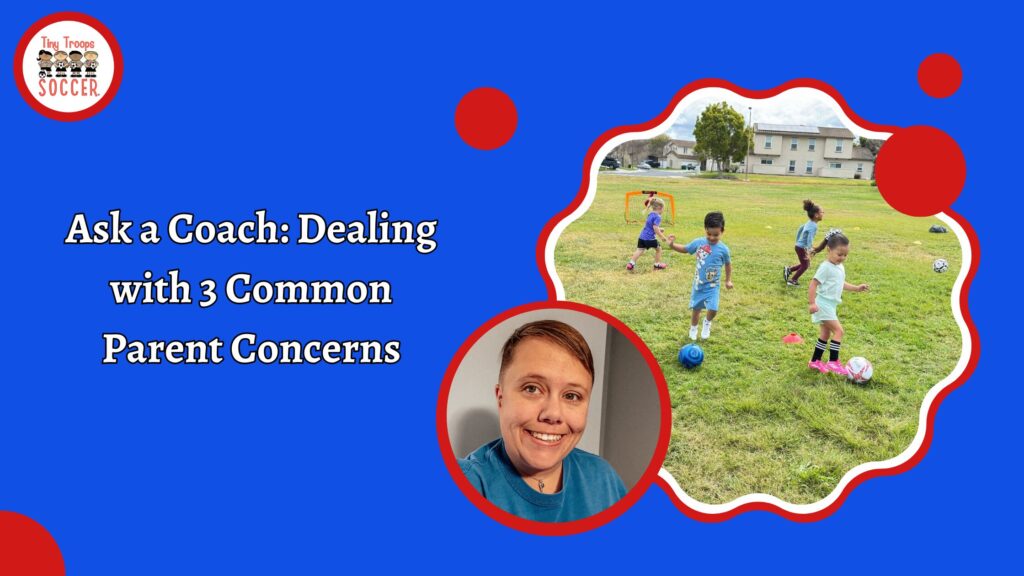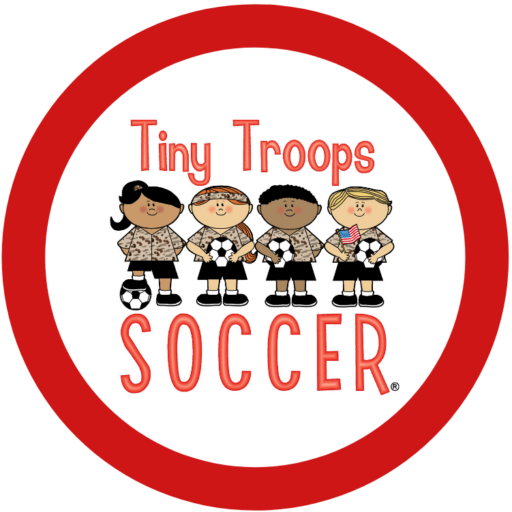Ask a Coach: Dealing with 3 Common Parent Concerns
Home » Ask a Coach: Dealing with 3 Common Parent Concerns

Coach Rachel from Fort Bragg here, and today we’re back with another Ask the Coach segment. Today, we’ll be taking a look at 3 common concerns parents and families may have when their little one first begins with Tiny Troops Soccer. Whether 18 months old or 3 years old, these concerns have no age limit and are something coaches often see in brand new players. Parents, you’re not alone, and it’s not just your kid. It’s normal and it’s perfectly okay! Here are three of the most common concerns—and how to handle them confidently and calmly.
Concern #1: “My child isn’t listening during class.”
At this age, toddlers and preschoolers are learning to listen and follow directions. They may be used to only listening to their parents and guardians. Toss in coach, a person new to them, as well as a new environment, and it can be a recipe for chaos. Our little players are still learning how to focus and how to self-regulate. A child might decide to run off Soccer Island, kick the ball wherever they want, or stop because they saw a butterfly. At my location? Planes and emergency vehicles are the great show stopper.
How to handle it: First, don’t stress! Coaches have seen this many times. Our lessons are designed to keep short attention spans engaged. Often, we’ll call your little one’s attention back to the activity at hand, or try to redirect them back to task. And if there’s a “show stopper” that grabs everyone’s attention, we’ll address it before moving back to the game. At home, you can help your little one practice using their listening ears with action songs like “Wheels on the Bus” or “Ring Around the Rosie”. Play games like “Simon Says” or “I Can, Can You?” with your Tiny Trooper.
Concern #2: “My child just runs around the entire class. Are they even learning?”
The short answer? Yes! It may look chaotic from the sidelines, but your child is still learning. They’re working on gross motor skills – running, kicking, and balancing. These skills are important to their development, and help them learn about different ways to move their bodies.
How to handle it: Instead of focusing on what they aren’t doing, focus on their enjoyment. Are they having fun and laughing? Are they excited to be in class with their friends? Celebrate these little moments- the smiles, the laughter, and the participation. Don’t worry- they are still learning.
Concern #3: “My child is shy and refuses to go on Soccer Island.”
Jumping in right away to a new sport can be hard. It’s a new activity, with new faces, new things to do, and often in a new place they’ve never been before. It can be very overwhelming to a little one! Your Tiny Trooper may feel some combination of shyness, anxiety, or fear, which are all normal for their age. Some Tiny Troopers just need time to warm up first before they can jump in and participate.
How to handle it: Patience is key. As parents, we want our little ones to jump right in and participate, but that’s not always the case. Give your Tiny Trooper time, and reassure them along the way. Don’t push them too hard to participate right away. Let them observe the class activities instead on the side with you, and talk about what is happening on Soccer Island. Cheer them on when they make steps toward participating, even if it’s just doing the obstacle course at the end of class. Big or small, we celebrate it all. Often after a few classes of seeing the routine, their peers, and their coach, little ones naturally become more engaged. Of course, this is an average estimate. Every child is different and may take more or less time.
Wrap-Up
Every child adjusts to Tiny Troops Soccer differently, and there’s no “right” way to participate when first getting started. With time, consistency, and encouragement, your child will grow more confident in themselves and their soccer skills.
So hang in there, cheer them on, and remember—you’re doing great too!

